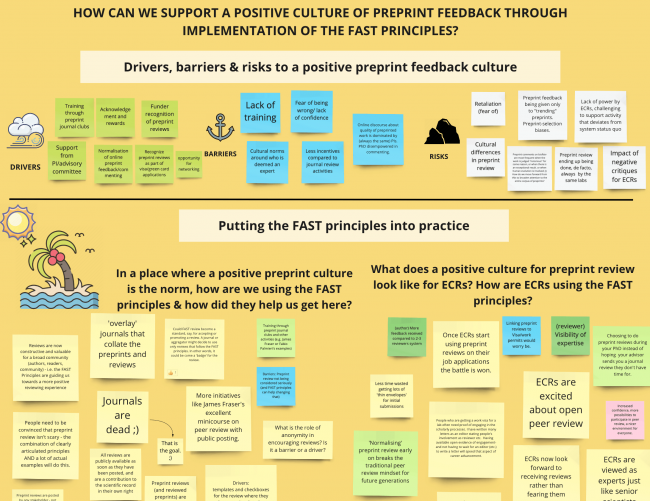Projects encouraging feedback on preprints
ASAPbio’s Preprint Reviewer Recruitment Network aims to help researchers, especially ECRs, break into reviewing or editing roles by sharing their comments and reviews of preprints as examples of their work. Comments and feedback to preprints can occur in many forms. We are partnering with PREreview to host a live-streamed preprint journal club, an opportunity for…
Our crowd preprint review trial has been running for a month. We discuss the trial in this blog post on Sciety.org. [External link]
ASAPbio’s Preprint Reviewer Recruitment Network aims to help researchers, especially ECRs, break into reviewing or editing roles by sharing their comments and reviews of preprints as examples of their work. We recognize that people have diverse backgrounds and prior experiences in peer review. To assist researchers in the Network in developing their expertise with writing…
The growth of preprints in the life sciences has amplified earlier concerns about the challenges of keeping abreast of the latest research findings. Researchers need to keep up to date not only with the most recent publications in journals but also with the latest scholarly work posted on preprint servers. Three quarters of the respondents…
By Victoria Yan At the ASAPbio #FeedbackASAP meeting held on July 21st, 2021, the Sciety team (Hannah Drury, Godwyns Onwuchekwa, and Paul Shannon) led an interactive session examining different aspects of the evolving landscape of preprint curation and review. What is curation? We began the session by brainstorming what curation encompasses. Through a mind-mapping exercise,…
As part of the July 21, 2021 FeedbackASAP meeting, Ludo Waltman (CWTS, Leiden University), James Fraser (UCSF), Cooper Smout (Free Our Knowledge) organized a breakout session entitled “Posting journal reviews on preprints” to identity an evolutionary bridge between a system based around journal-organized peer review and referred preprints. Peer reviewing: for whom and why? The…
By Rebeccah Lijek and Jessica Polka At the July 21, 2021 #FeedbackASAP meeting, Mugdha Sathe (UW), Rebeccah Lijek (Mount Holyoke), Daniela Saderi (PREreview) organized a breakout session on using public preprint review in teaching and mentorship of early career researchers. Who is a “peer?” The session began with Daniela Saderi leading us in discussion about…
2022-01-13 update: The FAST principles have now been posted as a preprint. As Chris Jackson pointed out in the first session of #FeedbackASAP, preprint feedback is part of the collaborative culture of science. A positive culture of comments and review of preprints brings many benefits to the scientific process, but what does this culture look…
We are thrilled to announce that we will be running a trial to test the crowd review approach for preprint review. We invite cell biologists with an interest in preprints and preprint feedback to join this trial. Why is ASAPbio running this trial? While there is increasing interest in review activities around preprints, the level…
Today, we’re excited to launch the Preprint Reviewer Recruitment Network, a pilot to share researchers’ preprint reviewing experience with journals looking for reviewers or editorial board members. Public preprint feedback has the potential to not only help authors and readers, but also to identify potential reviewers and editorial board members for journals. Unfortunately, finding preprint…
2022-04-27 update: The principles are the focus of a Point of View article in eLife. 2022-01-13 update: The FAST principles have now been posted as a preprint. As Ivan Oransky has noted, ‘science is a proposition and a conversation and an argument’ [1]; feedback and discussion around scientific reports are integral parts of the scientific…
We’re thrilled to announce the speakers for the July 21 #FeedbackASAP meeting! These individuals will discuss why public preprint feedback is needed and what institutions and societies are doing to support it in two plenary sessions at the beginning of the meeting. Time in UTC (duration) Title Description 15:00 (5’) Welcome Kickoff and announcements 15:05…
Blog post by Daniela Saderi and Sarah Greaves In May 2020 a group of publishers and organisations made a direct call in response to the urgent need to openly and rapidly share and review COVID-19 research. More than 2,000 reviewers signed up: their details were shared with the journals or platforms involved, and they were…
Blog post by Christine Ferguson and Martin Fenner Information overload is the difficulty in understanding an issue and effectively making decisions when one has too much information about that issue, and is generally associated with the excessive quantity of daily information. – Wikipedia [1] Information overload is a common problem, and it is an old…













![Yearly preprints/all-papers in Microsoft Academic Graph, trend by domain Yearly preprints/all-papers in Microsoft Academic Graph, trend by domain, reproduced from Xie B, Shen Z, and Wang K 2021 [8]](https://asapbio.org/wp-content/uploads/2021/07/Screenshot-2021-07-01-at-10.03.25-650x422.png)